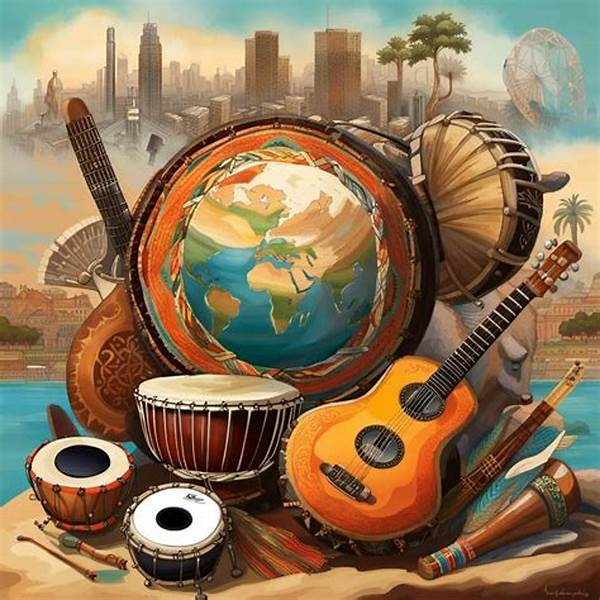Music has a profound ability to reflect, shape, and define cultural identities across the globe. From tribal rhythms chanted around a fire to the pulsating beats of a city club, music connects individuals and communities, weaving a tapestry of shared experiences and values. This melody of life binds us, fostering a unique cultural identity shaped by music.
Read Now : Popular Songs On Deezer Right Now
The Rhythm of Culture
When we speak of cultural identity shaped by music, we’re diving deep into how tunes and lyrics resonate with our core. Music isn’t just background noise; it’s the heartbeat of cultures. The kinda thing that gets your grandparents tapping their feet at family reunions or sparks up friendly debates about who the greatest rapper alive is. Music’s role in shaping cultural identity lies in its ability to convey stories, traditions, and emotions. Whether it’s the soulful blues capturing the struggles and dreams of African-American communities or K-pop’s vibrant beats echoing South Korea’s global influence, every note has a tale to tell. Essentially, it’s all about how music influences everything from fashion to vernacular – yup, those catchy phrases you and your homies throw around.
The Groove of Identity
1. For the real ones, cultural identity shaped by music is like a fingerprint, unique to each group.
2. Music ain’t just beats; it’s a vibe that defines who we are and where we at.
3. It’s the way soundtracks from the hood or barrio give us pride and context.
4. The rhythm of a place often aligns with the pulse of its people; music mirrors that true story.
5. Each genre is a voice, a street corner philosopher, schooling us on the culture.
Beats, Bars, and Belonging
You ever notice how a track can instantly transport you to a memory, a moment, or even a feeling of belonging? Bam! There you are, back at that summer barbecue, or reliving the drama of high school prom. That’s the power of cultural identity shaped by music. It’s a bond that transcends borders, syncing us up with folks miles away who vibe to the same jam. You might not speak the same language, but when that beat drops, you know you’re in sync.
Read Now : Anthems For Spreading Positivity
As the world grows tighter and cultures intermingle, music remains a constant, evolving yet unchanged in its core purpose: connecting and defining. From hip-hop heads in New York to samba enthusiasts in Rio, music is a universal passport. And with every beat drop, we’re reminded that even though our playlists might differ, the boom-bap or samba beat is a universal sign of cultural identity shaped by music.
Sonic Snapshots of Life
Vibrations of Cultural Tapestry
Music isn’t just about sounds; it’s a language, bro. It’s how we bond, how we learn, how we express what’s buried deep and personal. Cultural identity shaped by music means everyone gets their own alto to shine in the grand chorus of life. The sleek fusion of genres – think jazz with a sprinkle of Afro beats or rock with a dash of electronic – showcases the ever-evolving narrative of global identity. This is how traditions merge, yet stand apart, highlighting diversity within unity.
In the realm of music, there’s no judgment, only expression. Dive into hip-hop, and you hear the grit and hustle of urban life, making cultural identity shaped by music a powerful tool for storytelling. Or rock out to folk, painting pictures of simplicity and roots. Music embodies all, from the political to the personal, making each beat count. For every person tapping their feet to an imagined drumbeat in daily life, music becomes more than sound; it’s an identity echoed across generations, cultures, and history.
Harmonizing Values and Tunes
Cultural identity shaped by music plays a key role in the intricate dance of modern life. It’s how we share stories from our community’s chapters, a blend of joy and struggle set to rhythm and rhyme. Music brings people together, letting us wear our identity like a badge. Regardless of where you kick it – maybe on the urban grind or chilling by the beach – there’s a track that captures your own narrative.
Songs become like mirrors, reflecting whose we are in all our complexity. Whether you’re belting out tunes at a karaoke bar or spinning vinyl records, music transcends the ordinary, allowing you to find your voice through collective narratives. Along with the shifting cultural landscapes, the music changes too, yet at its core, it remains the amplifier of any community’s spirit. That’s cultural identity shaped by music—unity in diversity, harmony in personal expression, a universal chorus stitched together by diverse yet harmonious notes.
